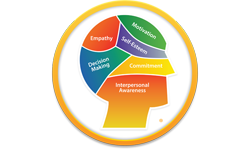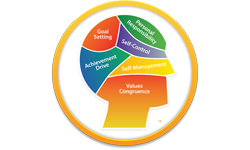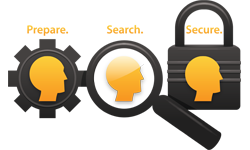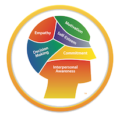Want your students to be successful...?
Where Do I Begin?
The very first thing you need to do when teaching social and emotional learning is identify an effective process:
- Assess the individual’s social/emotional competencies
- Assign intervention based on their individual results in areas of greatest need
- Post-assess to document skill acquisition
What is Social and Emotional Learning?
Social and Emotional Learning (SEL) is our ability to read, understand, and manage our own emotions and the emotions of others. Unlike other types of learning, SEL does not follow a linear development process; instead, these skills become more important as the need presents itself. One example of this is motivation. Motivation is usually triggered by a deep desire to achieve or accomplish something. This desire to achieve something leads to goal setting. Research at Harvard and other research centers shows that, for young boys in particular, the frontal part of the brain, or frontal lobe, that controls the goal-setting process does not develop until the teen years. It is also known that without a goal, critical SEL skills like motivation, commitment and time management are not needed and, consequently, not developed. Attempting to teach these skills to young boys before their brains are fully developed and before they are ready to use these skills only results in frustration and failure, but this is what often happens.
If you want to be successful in developing social/emotional learning skills in the lives of the individuals you work with, you need a different strategy. Instead of trying to address the symptoms (like bullying or bad grades), you need to address the root of the problem.
Benefits of Social and Emotional Learning
Our 51 Benefits of Social and Emotional Learning e-Book is a wonderful FREE resource that provides information on tangible benefits in the following areas:
- Social
- Emotional
- Personal
- Leadership
- Professional
- Economic
We’ve done over 30 years of research on the topic of social and emotional learning. The link between these “success skills” and the degree of personal and professional success you achieve in life is undeniable. This e-Book helps highlight some of the benefits of focusing on Social and Emotional Learning.
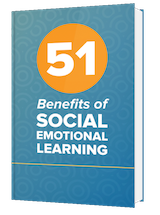
Building Blocks of Social and Emotional Development and Social and Emotional Intelligence
To understand the core abilities of Social and Emotional Learning (SEL) or Emotional Intelligence (EQ), you must begin with an understanding of core abilities that are related to personal success. These key skills serve as a foundation for all learning, similar to building blocks. While the six SEL building blocks focus primarily on personal growth and development, they consequently help us to strengthen our interpersonal relationships as well. Developing EQ helps decrease bullying, promote anger management, and increase self-determination. Developing these skills helps build stronger students today, and more successful leaders tomorrow.
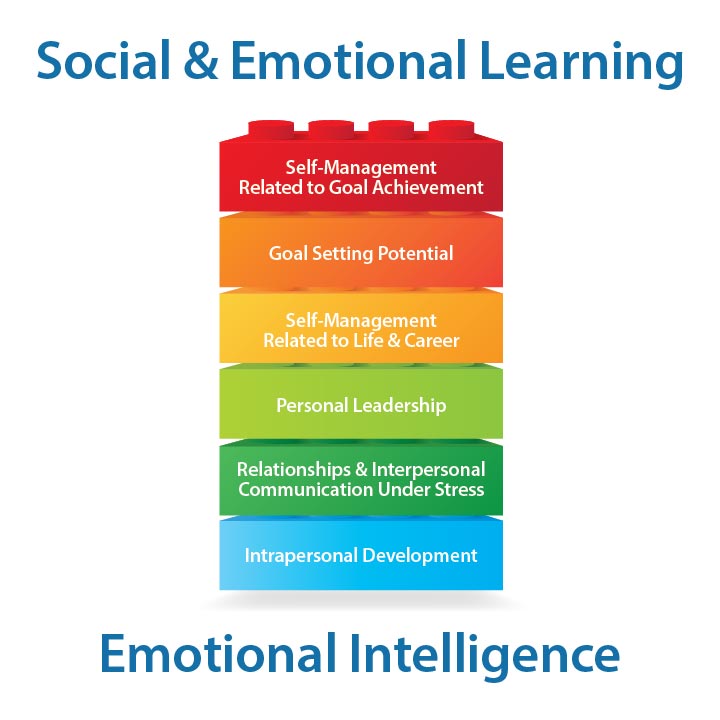
Intrapersonal Development
- The Importance of Having a Positive Attitude
- Keeping Your Focus
- Doing Your Best
- Responding to Guidance or Direction
- Controlling Your Emotions
- Being Flexible
Intrapersonal Development is all about developing your awareness of your own thoughts, feelings, and emotion and then learning how those thoughts, feelings, and emotions affect your behavior. Three components that affect your intrapersonal development are self-esteem, stress management, and physical wellness. Just think about that for one moment. Do any of your students lack self-esteem or self-management skills? Do you know anyone who, no matter how hard they try, cannot manage themselves, much less others around them? Being able to balance your own life is critical to learning how to help others reach their goals, so don’t overlook this small but important step.
Relationships & Interpersonal Communication Under Stress
Maybe you woke up late and haven’t bounced back from your hectic morning, maybe you have a giant deadline hanging over your head, or maybe you just have too much work and not enough time. Whatever the situation, it is essential to learn how to effectively communicate and maintain your relationships while under stress. A helpful hint is to avoid emotional responses such as anger, aggression or defensiveness, and instead assert yourself in a calm and constructive manner. Sometimes this means briefly walking away from a stressful situation, finding the root cause of your emotional response, and returning with a clear head.
Can you imagine a real-life scenario in which this information could positively impact your students? Take Michael, for example:
Social and Emotional Learning – Aggressive Student
 Michael has a behavior problem. Anytime you confront him about something positive or negative he has an outburst. He thinks the worst regardless of the situation and doesn’t show up to class very often. The one thing that keeps him going is technology. In fact, he built an app that helps pick your outfit in the morning so you can get ready faster. Individuals with this profile could be a real problem. Self-Esteem is low, they do not get along well with people, and they really do not care. The biggest problems come from the low empathy and the very high aggression that they exhibit in order to feel good about themselves. They will walk on others in order to feel good about themselves or to get their way, and they do not care about hurting others. The most important thing to them is to get their way, no matter what. They are angry at the world. Any little thing could set them off. They usually express themselves through hostile and attacking behaviors when conflict arises. They have a tendency to rebel and be resentful, and they will usually be overly sensitive when confronted. They are not interested in changing at this time of their lives.
Michael has a behavior problem. Anytime you confront him about something positive or negative he has an outburst. He thinks the worst regardless of the situation and doesn’t show up to class very often. The one thing that keeps him going is technology. In fact, he built an app that helps pick your outfit in the morning so you can get ready faster. Individuals with this profile could be a real problem. Self-Esteem is low, they do not get along well with people, and they really do not care. The biggest problems come from the low empathy and the very high aggression that they exhibit in order to feel good about themselves. They will walk on others in order to feel good about themselves or to get their way, and they do not care about hurting others. The most important thing to them is to get their way, no matter what. They are angry at the world. Any little thing could set them off. They usually express themselves through hostile and attacking behaviors when conflict arises. They have a tendency to rebel and be resentful, and they will usually be overly sensitive when confronted. They are not interested in changing at this time of their lives.
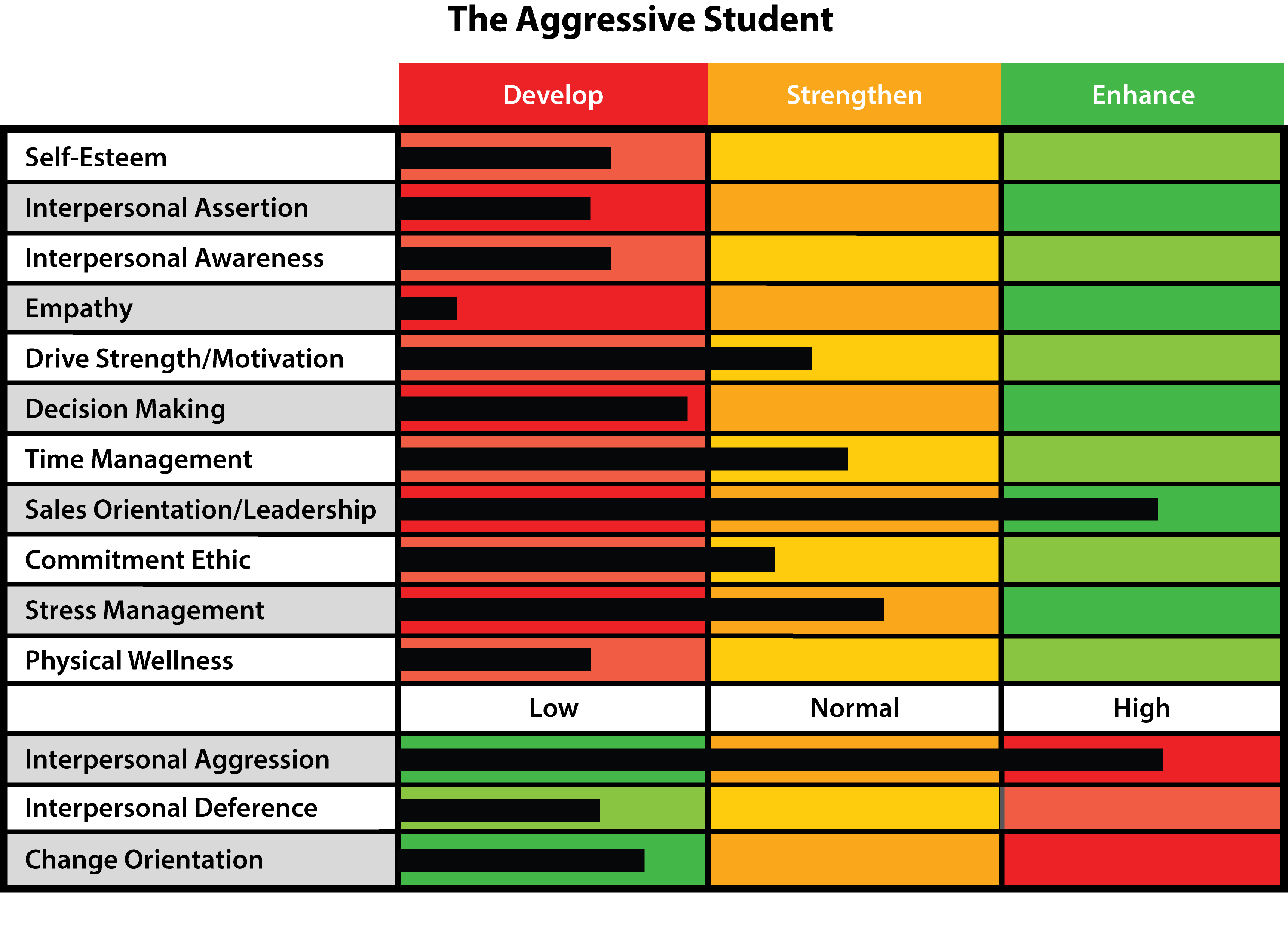
Personal Leadership
There are few things that can kill potential as quickly and as efficiently as poor leadership. To learn how to effectively lead others, start by first learning how to lead yourself. Cultivating a sense of empathy, increasing interpersonal awareness, and making tough decisions are just a few of the stepping stones to becoming a great leader as well as a strong team-player. Listening to the concerns of others and taking them into consideration validates their personal experiences, and helps you gain a reputation of trustworthiness and compassion. Having a positive relationship with the people you are leading is the first step to ensuring success for the group, not just for one person.
Self-Management Related to Life & Career
While having effective management from supervisors, teachers, or managers is great, it is not nearly as important as having strong self-management. The ability to balance your own time, stay motivated, maintain a code of ethics, and take initiative to make positive personal changes will serve you well in both your career and in life. Do you take time to exercise and eat right? Do you pray, meditate, or journal? Do you set goals in your personal or professional life and follow through without being nagged or reminded constantly? If you answered “yes” to those questions, you are well on your way to strong self-management. If you answered “no” to those questions, you might find yourself in a situation like Kim:
Social and Emotional Learning – Burnout

Kim is a hard worker, which is great! However, her lack of self-management in personal health and wellness often leaves her stressed. She feels like she has let a lot of people down in her life so she tries to please everyone – parents, grandparents, teachers. She seems happy, but she sometimes cries at night because of the pressure. This is a profile of an individual who might very well be suffering from a personally abusive pattern, possibly drug abuse. There is high stress and declining Personal Wellness and Self-Esteem. Permission is indicated for others to run over this person (high deference). Low-level Stress Management skills and Assertiveness skills, and not much personal comfort with students or co-workers is indicated. Reliance on Sales Orientation is high (possibly a conning mode), and the desire to change is great. The change will probably not happen without the firm help of someone else. Skills like Decision Making and Commitment Ethic are simply too low to carry this individual into a pattern of change without outside intervention.
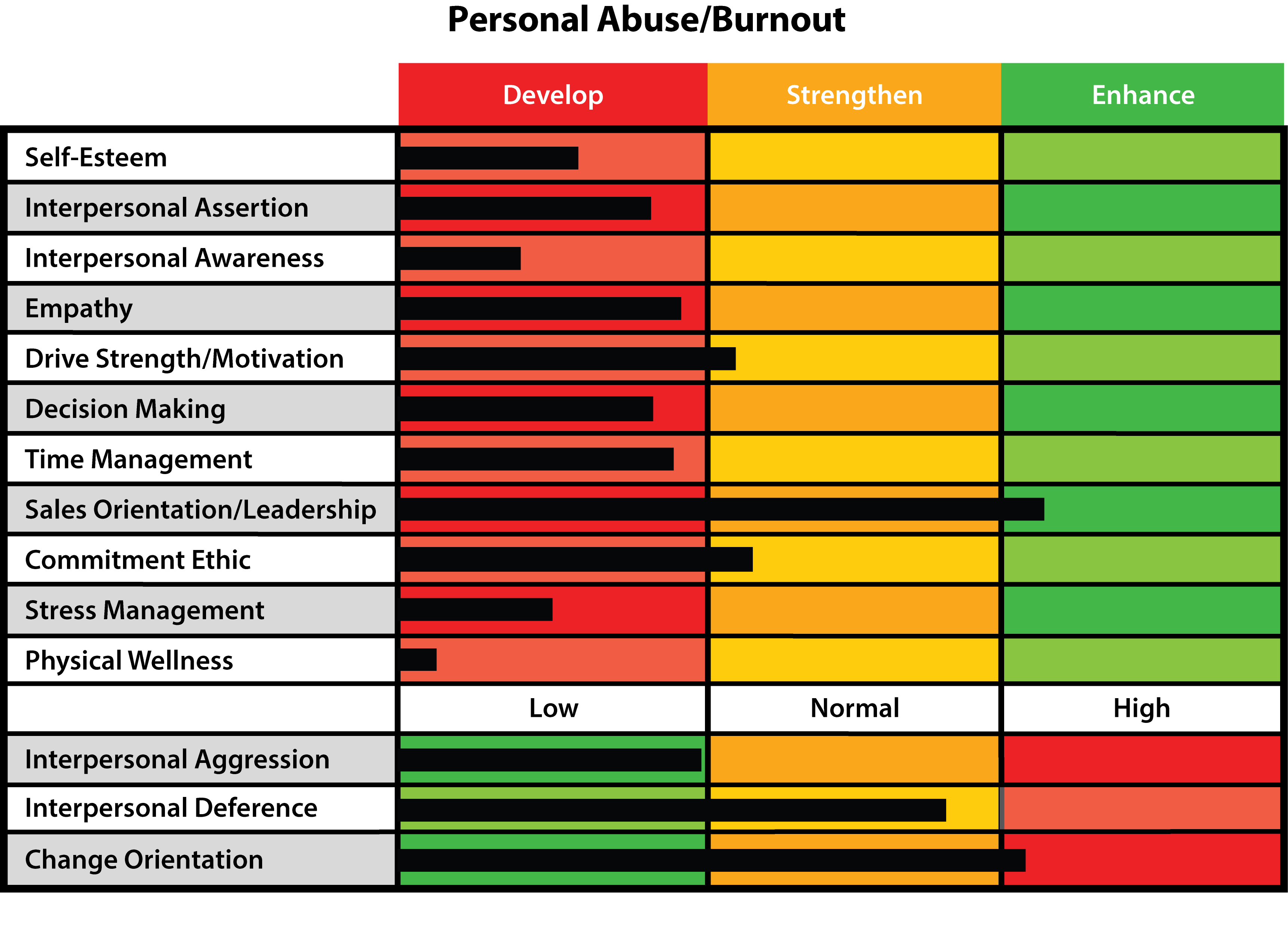
Goal Setting Potential
Part of being a successful person where you are, is knowing where you want to go. Lifelong learning has no set destination, and it is important to be intentional about setting and achieving goals. To set yourself up for success, practice self-confidence, consistent values, and strong internal motivation. While it’s possible for a goal to survive on internal motivation alone, it thrives with encouragement. Find a supportive community that believes in your vision and reach out for guidance and perspective along the way.
Self-Management Related to Goal Achievement
One the days you feel discouraged, how do you respond? While giving up on a goal is an easy option in the moment, it won’t do you any favors down the road. Being resilient, having self-control, and developing a sense of personal responsibility are great traits that lend themselves to effective problem solving, and help you navigate bumps in the road with ease. If you practice resilience in the small things, it will gradually become a habit that can be more effortlessly applied to the big things. One student who struggles with this is Marcus:
Social and Emotional Learning – Destructive

Marcus’ parents are divorced. He lived with his dad who went to jail already in his life. He doesn’t have too many positive role models in life. He hangs out with people involved in drugs and bullies a lot of the kids in school. Anytime he can get out of class he will take it.
Individuals with this profile are on a self-destructive course. Very little good is happening in their lives at the present time. They do not like themselves, and the future looks very dark. Relationships with others are almost beyond repair without outside help. There is no purpose to life and the stress is unbearable. They have little influence on the way things are going at school or work, have nothing to do with their time, and find it very difficult to make good decisions. They have difficulty standing up to others and cannot deal with conflict. They are very sensitive to threat and will tend to run away when confronted. They do not take care of themselves physically or emotionally. The one good thing going for them is the fact that they want to change. If change does not occur, they could look for ways to get out or get away from it all. This is where leadership in Emotional Intelligence and Soft Skills in the classroom is essential. Showing Marcus how to make connections and move forward with purpose will not only help him at school, but will also give him the tools he needs to succeed after the bell rings.
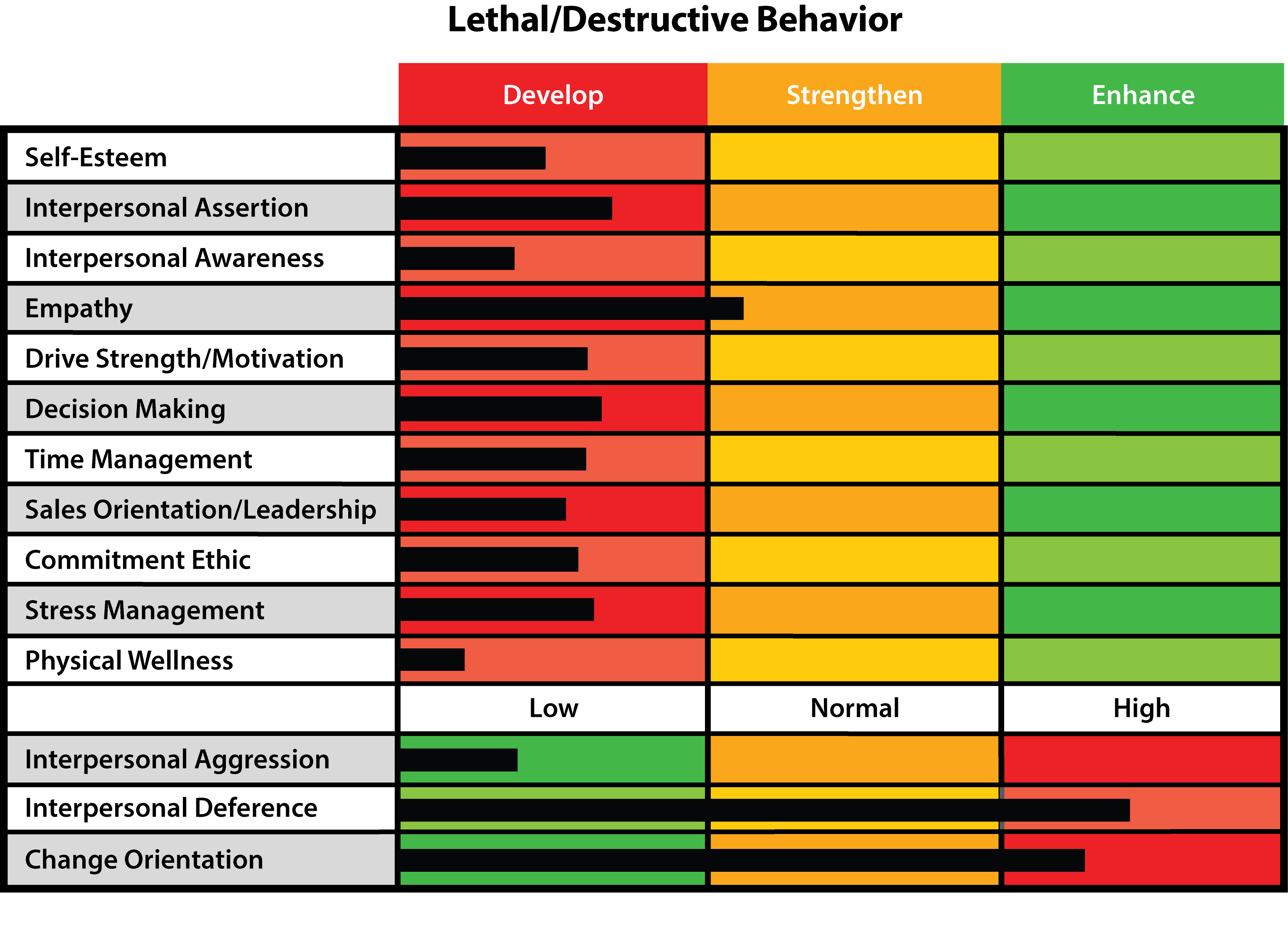
Social and Emotional Learning – Successful Leader
This pattern predicts a person who is a strong leader. All of the skills are high and many are in the Skill to Enhance area. Some of the skills may never reach the Skill to Enhance area because it is hard to use all of these skills on a daily basis. This individual should make a good leader because personal skill capacity has been developed. This person could even assist others in their skill development. The high Sales Orientation level indicates the ability to have great influence and impact on others. This individual feels good about himself and his ability to work with others. He is inner-driven, follows through, and is able to be organized, to solve problems, and to make good decisions as well as to communicate in ways that do not hurt him or others.
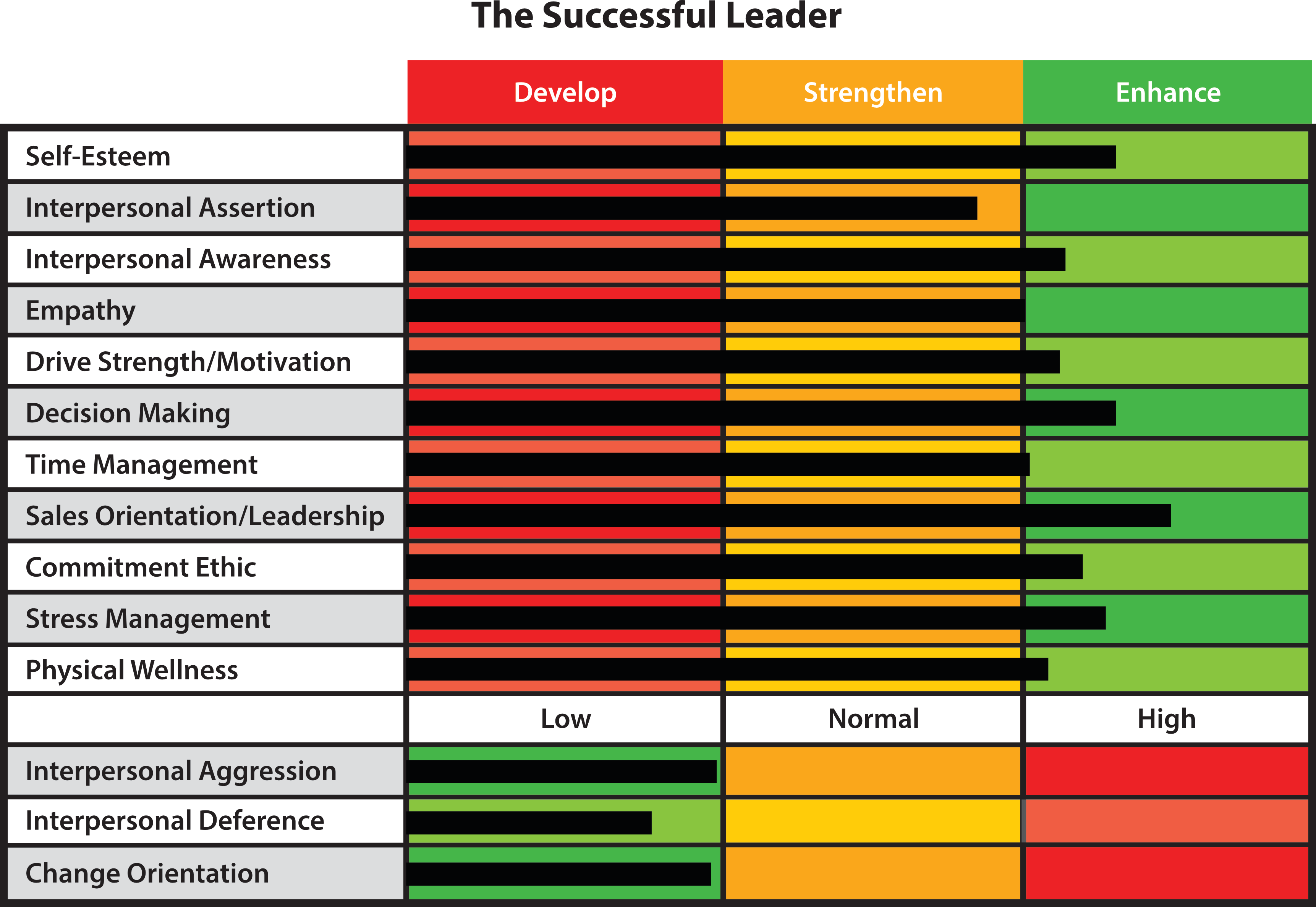
“A leader’s intelligence has to have a strong emotional component. He has to have high levels of self-awareness, maturity and self-control. She must be able to withstand heat, handle setbacks and, when those lucky moments arise, enjoy success with equal parts joy and humility. No doubt emotional intelligence is more rare than book smarts, but my experience says it is actually more important in the making of a leader.
You just can’t ignore it.”
“Social and Emotional Learning is a skill that can be develop to help kids learn about themselves and others. Being aware of our own emotions and how we react and respond will transform the way we handle adversity and lead in our lives.”
“Knowing where a student begins and ends with SEL is critical for showing our programs impact.”
Conover Online
Conover Online™ is a unique research-based approach for assessing and teaching personal success skills like (social-emotional learning) needed in all areas of life. Here are a few of the programs included in Conover Online.

